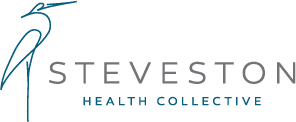TCM Acupuncture
helps with:
- Headaches
- Low pack pain
- Nerve pain
- Neck pain
- Joint pain
- Chronic pain
- Muscle pain
- Muscle tightness


We are so fortunate to have Erin Moran as our affiliate provider – she is located just down the street from us at the Steveston Health Collective. Collaborative care is what they do best! Ask your practitioner if Acupuncture is an appropriate adjunct treatment to your care to help you be your best self!
TCM Acupuncture is sometimes used as an effective adjunct to physiotherapy, massage therapy & clinical pilates to treat a wide range of conditions.
Traditional Chinese Medicine (TCM) acupuncture is based on a complete system of medicine and has been developing for the past 3000 years. The terminology of TCM reflects how it looks at the body as a garden rather than a machine. We tend to areas of the garden where the soil may be deficient in a specific nutrient, or where weeds may be inhibiting proper growth.
Translating this to the body, perhaps there is a deficiency within the digestion where the transit time is too fast. We can work with acupuncture to slow down the transit time for optimal absorption of nutrients. The acupuncture points for digestion are located in arms, legs and torso and they run along fascial or connective tissue planes and have embryological origin to the digestive organs.
If there is scar tissue between the fascial and muscle layers of the shoulder, for example, inhibiting good range of motion, TCM acupuncture can help to open fascial pathways through the shoulder to improve movement and lessen pain.
Working alongside IMS, physiotherapy and clinical pilates, TCM acupuncture offers a truly holistic approach so that overall health goals can be met.

Offering: Traditional Chinese medicine (TCM), 5-element acupuncture, myofascial cupping therapy
Specialty areas: Pain management: sciatica, frozen shoulder, tennis/golfer’s elbow, carpal tunnel, plantar fasciitis, migraines, hip pain, knee pain. Integrative oncology: minimizing side effects of cancer treatments and offering care in survivorship.
Other Areas: Digestion, autoimmune & hormonal issues, stress management, emotional balance.
My goal is simple. I want you to feel better and to be your best self.
Erin has been practicing Traditional Chinese Medicine (TCM) since 2001. With an undergraduate degree in biology and one year of dental school under her belt, she brought plenty of skepticism to her training in Chinese medicine. After exhausting her teachers with questions about mechanisms of action and the need for tidy flow charts, she heeded their advice: “wait until you start your clinical training. You will see. It works.”
Indeed they were right. Chinese medicine works. In many cases. On a daily basis, Erin was amazed to see that a certain protocol of acupuncture points, based on symptoms and tongue and pulse presentation, dealt with the problem with significantly more success than all of the other modalities a patient had tried. Her skepticism started to turn into intrigue and she felt the need for deeper study.
Through her training, Erin learned that TCM is excellent for treating the here-and-now physical manifestations of an internal imbalance. However, she felt something was missing in that TCM did not address the problems arising from mind and spirit imbalances.
This led her to Five-Element Acupuncture, which works at a deeper level to correct the root of the symptom. We are living in a culture where, for the most part, our basic needs are met: people are clothed and fed and have a roof over their heads. Many more symptoms arising are as a result of mind and spirit level problems. These are difficult to treat in conventional medicine and TCM. But the Five‑Element approach, with its gentle and subtle rebalancing, can be a game-changer.
Most importantly, Erin is results-oriented. If something is not working with the treatments, she is not afraid to refer to and/or collaborate with other health care providers. Often the best effects for complex cases are achieved when the approach is multi-faceted.